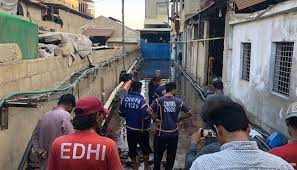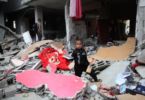According to the media, at least 12 people died and five others were injured in a stampede during a free distribution of charity inside the premises of a factory at the Naurus intersection in Karachi’s SITE area on Friday.
According to the details, the incident occurred while people were gathered at a dyeing factory in the city’s industrial area to collect free ration and zakat which was a part of charity drives that Karachiites hold every Ramadan to help the needy. The reports suggest that the majority of the deceased were women, children, and elderly people who lost their lives due to rush and panic at the venue. Meanwhile, Chief Minister Murad Ali Shah has announced Rs500,000 compensation for the families of the deceased and Rs100,000 for those injured in the incident.
The economic situation of the country has witnessed unimaginable degradation in recent years mainly due to the disastrous effect of the COVID-19 pandemic followed by the global energy crisis and war in Ukraine, while the eternal economic frailty of the country was another reason that double down the worst impact of inflation on the poor masses in Pakistan.
According to the World Bank report, the global energy crisis and a long-held wave of inflation have raised the cost of living and contributed to spiraling poverty and the worst humanitarian situations prevail in most developing nations in the world. As said, about 2 million Pakistanis get below the poverty line on an annual basis while these figures have crossed 18 million in the current year.
Unfortunately, unrestricted inflation and rising poverty seriously damaged the core fabric of Pakistani society, destroyed moral values, promoted selfishness among the masses, and gave rise to corruption, crimes, beggary, fraud, and other social evils in the community. The begging has become a business while sufficient numbers of non-entitled people feel no remorse over getting undue benefits including zakat, BISP payments, and charities from the government and private organizations that not only deprived the disadvantaged segments of their rights but set bad trends in the public.
The recent unfortunate Karachi incident was one of the many stampedes that have occurred in recent weeks claiming the lives of half a dozen people and injuring several others across Pakistan, mostly occurring at free wheat flour distribution points under the government-sponsored relief schemes currently underway in the country. Those heartbroken events shocked the entire nation regarding the level of poverty and impoverishment of the public in the country.
Such incidents are not only a slap on the face of the ruling elite but also a matter of shame for the government and society in that a huge number of masses live below the poverty line and could not satisfy their needs respectfully. On the other hand, the government and well-off section of society failed to support them in a dignified manner, yet organizing charity distribution events, and photo shoots became customary for the so-called public saviors, philanthropists, and social workers in this modern age. After all, free flour, Sasti Roti, langar, and Panah Gah Programs all were temporary and politically motivated initiatives aimed at boosting rulers’ politics and public rating, thus no such initiative could bring an everlasting change to public life and prove to be poisonous for the national economy.
Currently, poverty has shaped into a grave challenge to the nation, and the government was unable e to address this issue alone. Pakistan is a generous nation, and multiple charity organizations and well-off Pakistanis channel billions of rupees to charity work each year. Hence, a public-private partnership and the use of BISP data for the identification and compensation of rightful persons become highly essential at this point. So, this magnificent work could be accomplished in a dignified manner permanently, the needs of the poor be fulfilled smoothly and no needy get hurt or die in such regretful events in the future.







